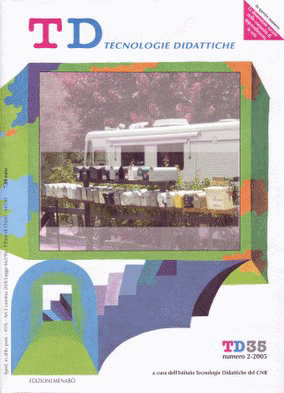Identity positions and participation in online communities of practice
Main Article Content
Abstract
Article Details
Section
Authors who publish with this journal agree to the following terms:
- Authors retain copyright and grant the journal right of first publication with the work simultaneously licensed under a Creative Commons CC BY 4.0 Attribution 4.0 International License.
- Authors are able to enter into separate, additional contractual arrangements for the non-exclusive distribution of the journal's published version of the work (e.g., post it to an institutional repository or publish it in a book), with an acknowledgement of its initial publication in this journal.
- Authors are permitted and encouraged to post their work online (e.g., in institutional repositories or on their website) prior to and during the submission process, as it can lead to productive exchanges, as well as earlier and greater citation of published work (See The Effect of Open Access)
References
Bachtin M. (1973), Problems of Dostoevsky’s poetics, Ardis, Ann Arbor, MI (prima edizione pubblicata nel 1929 con il titolo Problemy tvorchestva Dostoevskogo)
Billig M. (1987), Arguing and thinking. A rhetorical approach to social psychology, Cambridge University Press, Cambridge, MA
Biocca F. (1997), The cyborg’s dilemma: Progressive embodiment in virtual environments, Journal of Computer-Mediated Communication, vol. 3, n. 2
Brown A. L., Ellery S., Campione J. C. (1998), Creating zones of proximal development electronically, in J. G. Greeno e S. V. Goldman (eds.), Thinking practices in mathematics and science learning, Lawrence Erlbaum Associates, Mahwah, NJ, pp.341-367
Bruner J. S. (1988), La mente a più dimensioni, Laterza, Roma-Bari
Bruner J. S. (1997), La cultura dell’educazione, Feltrinelli, Milano
Bucceri A. (2004), Le voci della rete. Per una sociologia delle comunità virtuali, Plus, Pisa
Cacciamani S., Cesareni D., Ligorio M. B., Martini F. (2005), Il Collaborative Knowledge Building Group: una comunità di ricerca italiana su ambienti di apprendimento e di lavoro supportati dal computer, in Rassegna di Psicologia, n. 1
Cole M. (2004), Psicologia culturale. La disciplina del passato e del futuro, Carlo Amore, Roma
Fairclough N. (1995), Media discourse, Edward Arnold, London
Gee J. P. (1999), An introduction to discourse analysis: Theory and method, Routledge, New York, NY
Glaser B. G. (1992), Basics of grounded theory analysis: Emergence vs. forcing, Sociology Press, Mill Valley, CA
Glaser B. G. (1998), Doing grounded theory: Issues and discussions, Sociology Press, Mill Valley, CA
Hakkarainen K. (2003), Emergence of progressive inquiry culture in computer-supported collaborative learning, Learning Environments Research, vol. 6, n. 2, pp. 199-220
Harré R., Van Langenhove L. (1991), Varieties of positioning, Journal for the Theory of Social Behaviour, vol. 21, n. 4, pp. 393- 407
Hermans H. J. M. (1996a), Voicing the self: From information processing to dialogical interchange, Psychological Bulletin, vol. 119, n. 1, pp. 31-50
Hermans H. J. M. (1996b), Opposites in a dialogical self: Constructs as characters, The Journal of Constructivist Psychology, vol. 9, pp. 1-26
Hermans H. J. M. (2001), The dialogical self: Toward a theory of personal and cultural positioning, Culture & Psychology, vol. 7, pp. 243- 281
Hermans H. J. M., Kempen H. J. G. (1993), The dialogical self: Meaning as movement, Academic Press, San Diego
Johnson F. (1985), The Western concept of self, in A. J. Marsella, G. de Vos e F. L. K. Hsu (eds.) Culture and self: Asian and Western perspectives, Tavistock Publications, New York, pp. 91-138
Lave J., Wenger E. (1991), Situated learning: legitimate peripheral participation, Cambridge University Press, Cambridge
Ligorio M. B. (2005), “Alberi e fili”: la costruzione di conoscenza nel forum, in M. Delfino, S. Manca, D. Persico e L. Sarti (eds.), Come costruire conoscenza in rete?, Menabò, Ortona, pp. 161-176
Ligorio M. B., Hermans H. (eds.) (2005), Lo specchio e il labirinto. Identità dialogiche nell’era digitale, Erickson, Trento
Ligorio M. B., Veermans M. (2005), Perspectives and patterns in developing and implementing international web-based collaborative learning environments, Computers & Education, vol. 45, n. 3, pp. 271- 275
Ligorio M. B, Spadaro P. (in stampa) Digital positioning and on-line communities, in P. Ole´s e H. Hermans (eds.) Dialogical self in movement
Ligorio M. B., Talamo A., Pontecorvo C. (2005), Building intersubjectivity at a distance during the collaborative writing of fairytales, Computers & Education, vol. 45, n. 3, pp. 357-374
Mannarini T. (2002), Comunità virtuali. Figure del legame sociale, in B. R Gelli. (ed.), Comunità, rete, arcipelago. Metafore del vivere sociale, Carocci, Roma
Mantovani G. (1995), Comunicazione e identità, Il Mulino, Bologna
Mininni G. (1995), Discorsiva mente, Edizioni Scientifiche Italiane, Napoli
Ong W. J. (1986), Oralità e scrittura. Le tecnologie della parola, Il Mulino, Bologna
Pirandello L. (1924), Ciascuno a suo modo, Bemporad, Firenze
Preece J. (2001), Online community. Designing usability, supporting sociability, John Wiley & Son, Chichester, UK
Renninger K.A., Shumar W. (eds.) (2002), Building virtual communities: Learning and change in cyberspace, Cambridge University Press, New York, NY
Scardamalia M., Bereiter C. (1992), An architecture for collaborative knowledge building, in E. De Corte et al. (eds.) Computer based learning environments and problem solving, Springer Verlag, Berlin, pp. 41-67
Serino C. (2001), I percorsi del sé, Carocci, Roma
Spadaro P. F., Ligorio M. B. (2005), Intrecci tra contesto e identità in un forum di discussione, in M. B. Ligorio e H. Hermans (eds.) Lo specchio e il labirinto. Identità dialogiche nell’era digitale, Erickson, Trento
Talamo A., Ligorio M. B., Zucchermaglio C. (2004), Identità negoziate, identità costruite in ambienti virtuali, Rassegna di Psicologia, vol. 21, n. 1, pp. 147-177
Wallace P. (2002), La psicologia di Internet, Raffaello Cortina, Milano
Wenger E. (1998), Communities of practice: learning, meaning, and identity, Cambridge University Press, Cambridge

